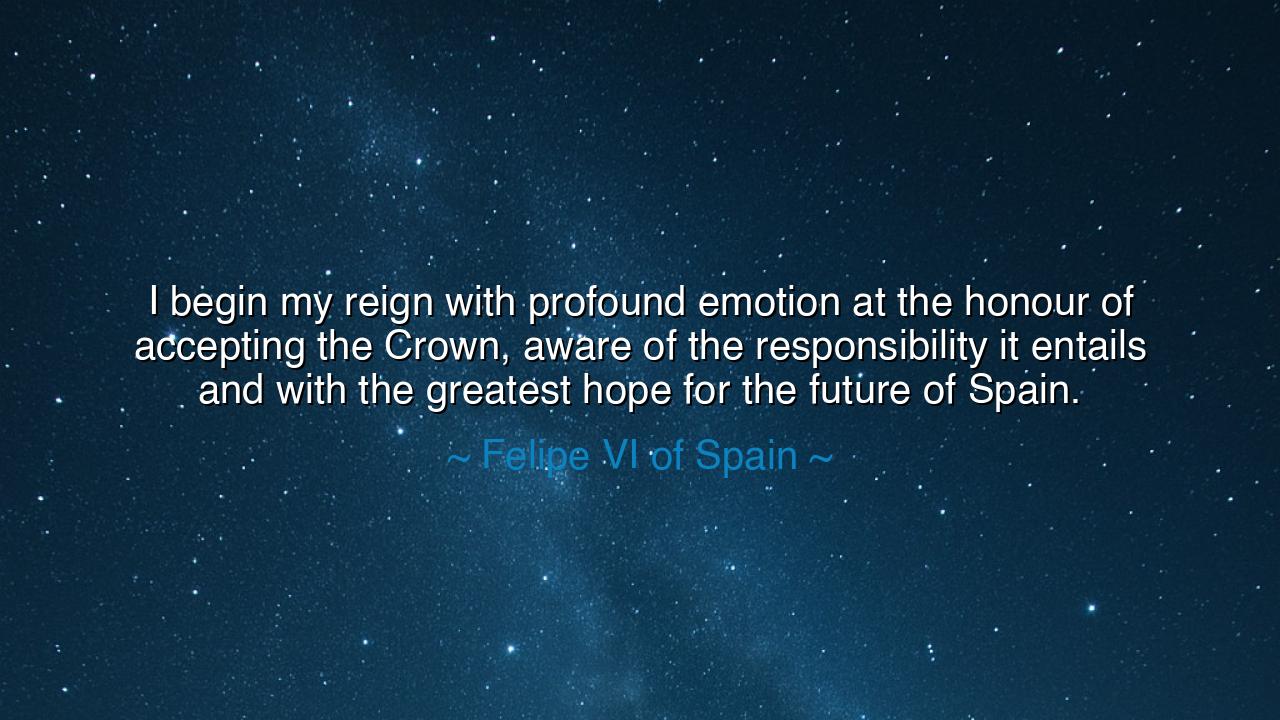
I begin my reign with profound emotion at the honour of accepting
I begin my reign with profound emotion at the honour of accepting the Crown, aware of the responsibility it entails and with the greatest hope for the future of Spain.






"I begin my reign with profound emotion at the honour of accepting the Crown, aware of the responsibility it entails and with the greatest hope for the future of Spain." These words, spoken by Felipe VI of Spain, are not merely a statement of duty, but a declaration of humility, responsibility, and a deep understanding of the weight carried by the Crown. They reflect the ancient truth that true leadership is not about the power one holds, but about the service one provides to those entrusted to their care. As Felipe VI steps into his role, he does so not with arrogance, but with a profound sense of the great responsibility he bears, recognizing that his actions will shape not only his reign but the future of the Spanish people.
In the ancient world, rulers were often seen as embodiments of their nation’s soul. The pharaohs of Egypt, the emperors of Rome, and the kings of Greece understood that the Crown was not a symbol of mere authority, but a charge—a responsibility to protect, nurture, and lead their people through times of peace and strife. Consider Alexander the Great, who, upon ascending the throne of Macedonia, was immediately faced with the enormous task of securing his kingdom and expanding it. His understanding of the weight of leadership drove him to seek not only military conquest but also the integration and prosperity of the peoples he ruled. He, like Felipe VI, recognized that his legacy would not be defined by his power, but by the lasting peace and stability he could bring to his people.
Similarly, the Roman emperors, despite their vast military conquests and extraordinary wealth, often began their reigns with solemn oaths to serve the common good. Augustus, for instance, understood that his reign could only endure if he governed with wisdom and justice. He spoke of the peace he brought to Rome, yet that peace was never taken for granted. It was earned through thoughtful governance, respect for the law, and a clear vision for the future. The Crown, as Felipe VI has acknowledged, is not merely a symbol of authority but a commitment to the betterment of the land and people it represents.
Felipe VI's words resonate deeply in the modern world, where the symbolism of power is often misconstrued as a measure of personal greatness. True leadership, as Felipe VI understands, comes with the realization that the honour of wearing the Crown is accompanied by the sacred duty to guide the nation through the challenges of the present and the uncertainties of the future. This sense of profound emotion is not the weakness of a man overwhelmed, but the recognition of the magnitude of the task before him—a task that demands not just strength but also wisdom, integrity, and vision.
As he steps into this responsibility, Felipe VI embodies the sacrificial nature of leadership—a leadership that is rooted not in self-glorification but in the welfare of those one serves. His statement reminds us of the importance of humility in positions of power. The true leader is not one who seeks to dominate, but one who lifts up those they lead, understanding that the strength of a nation is rooted in the strength of its people. The greatness of a leader lies in their ability to serve, in their awareness that true power is found not in commands, but in the trust and respect of those they govern.
There is an important lesson to be learned from Felipe VI’s words: leadership is not about personal glory or the accumulation of power, but about the service one provides to others. Whether one is a monarch, a politician, a business leader, or an individual in their community, the true measure of greatness is found in the responsibility one takes on and the hope they inspire in others. Felipe VI has expressed his hope for the future of Spain, and it is a hope grounded in a deep understanding of the responsibilities he bears—not just for today, but for the generations to come.
As we move forward in our own lives, let us reflect on the profound truth that leadership, in any form, requires a sacred sense of duty. It is not enough to simply hold a title or position; we must embrace the responsibility that comes with it and strive to guide those around us with wisdom, integrity, and a vision for the future. Like Felipe VI, we must approach our roles with humility, understanding that the true power we possess is measured not by what we can take, but by what we can give.






AAdministratorAdministrator
Welcome, honored guests. Please leave a comment, we will respond soon